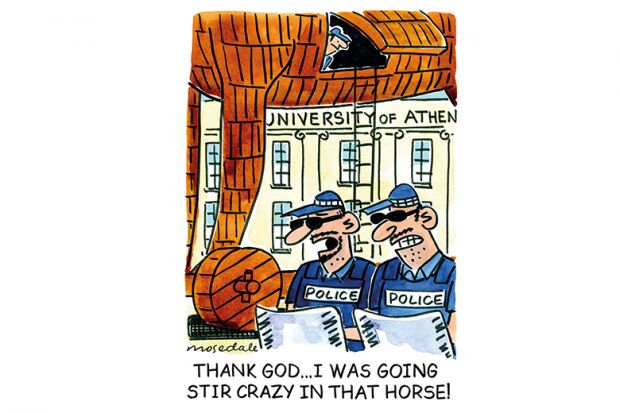
A law that had prevented police from entering universities in Greece has been overturned by the new centre-right government in a move that could spark unrest on campuses in the country. The law was brought in several decades ago in response to the crushing of a student uprising in 1973 at Athens Polytechnic by the ruling military junta and was seen as an important freedom by many on the left, The Guardian reported. However, Greece’s new prime minister, Kyriakos Mitsotakis, who made scrapping the law a key election pledge, argued that the law had become a shield for criminal elements to infiltrate universities. A potential flashpoint after the overturning of the law could be 17 November, the anniversary of the 1973 bloodshed, when protests and pitched battles with police often take place at Athens Polytechnic, also known as the National Technical University of Athens.
The natural law of campus bans determines that if one is lifted in one part of the world, another must be imposed somewhere else. Therefore, it should probably come as no surprise that Goldsmiths, University of London, has banned the sale of beef products from its campus from the start of the new academic year in an effort to become carbon neutral by 2025. The move will be accompanied by other environmental efforts such as a 10p levy on bottled water and a significant increase in the use of solar panels. The college’s new warden, Frances Corner, said that it was “impossible to ignore” the growing call for organisations to act on climate change. Students who feel bereft are unlikely to fret; Goldsmiths’ location in New Cross, a hotspot for greasy takeaways, means a burger will likely never be far away.
Nobel prizewinner Sir Andre Geim has clearly spent too long at the University of Manchester and absorbed the city’s drizzle-sodden climate, for his response to Boris Johnson’s plan to ease the visa regime to attract scientists after Brexit failed to muster any of the sunshine and optimism the new prime minister has spread about the nation. The government also pledged to underwrite bids for European Union funding submitted before the UK leaves. Gloomy Geim responded in comments to The Times: “The government may try and reduce the barriers to entry for scientists but they cannot reduce turmoil that would be caused to science in the UK by a no-deal Brexit. Scientists are not fools. They know that turmoil is inevitable for many years.” The “turmoil” of a no-deal Brexit is seen as likely to include the UK losing future access to European Research Council grants for outstanding researchers – which, as The Times might have noted, provided around £10 million of support for Sir Andre and Sir Konstantin Novoselov’s Nobel-winning research on graphene.
The “strongman” style is all the rage in politics – but it’s probably too early to try it in academia, if a case at Johns Hopkins University is anything to go by. Students and supporters occupied Garland Hall at the institution for 34 days earlier this year in protest against plans for a private campus police force and contracts with federal immigration authorities. That angered Daniel Povey, at the time an assistant research professor in engineering, “in part because a computer server that hosted his research was inside and malfunctioning”, so he used bolt cutters to open a door chained up by protesters, The New York Times reported. That prompted scuffles with protesters and the university has now fired him, saying his actions “endangered the university community”. Dr Povey responded that he “believed he could not receive a fair hearing at the university because he was white and many of the protesters were black or transgender”. He may have stoked divisions, but Dr Povey found a new job – at Facebook.
As culture wars take hold in universities, there are more effective means than bolt cutters to break down barriers – such as a donation worth about £28 million. The University of Queensland has become the second Australian higher education institution to agree terms with the controversial Ramsay Centre for Western Civilisation, which is expected to result in a new extended major being offered next year. Vice-chancellor Peter Høj said that the deal would give Queensland “a level of philanthropic support rarely seen in the humanities in Australia”, bankrolling “a rigorous sequence of study focused on small-group discussion, a study-abroad programme and student-centred learning”. But a petition from the Queensland branch of the National Tertiary Education Union says that the proposed curriculum is “regressive and outdated” and “has the potential to privilege students who are already privileged”.
Register to continue
Why register?
- Registration is free and only takes a moment
- Once registered, you can read 3 articles a month
- Sign up for our newsletter
Subscribe
Or subscribe for unlimited access to:
- Unlimited access to news, views, insights & reviews
- Digital editions
- Digital access to THE’s university and college rankings analysis
Already registered or a current subscriber? Login




